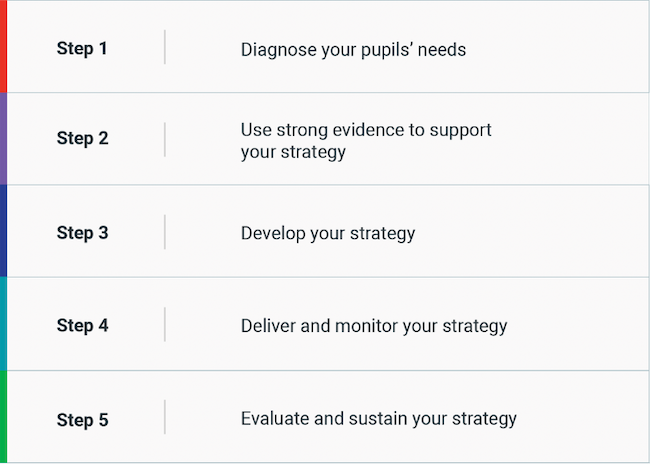
The pumpkins are away, and the lead-in to the Christmas period is well underway. Although not quite so festive, schools’ Pupil Premium strategies are just as important, and we know that schools are working carefully on theirs ahead of the deadline to submit to the DfE on 31 December.
If you’re considering which strategies, programmes, or interventions really make a difference, the Education Endowment Foundation recently published their Guide to the Pupil Premium. The guide covers how to plan, implement, monitor, and sustain an effective strategy, which will support schools to select strategies that have impact, offer good value for money, and specifically support Pupil Premium children to make disproportionate progress.
Broadly, the EEF advise that a good strategy combines these three things:
The guide takes a five-step approach to your Pupil Premium strategy:

We’ve pulled out our top tip from each step as an at-a-glance tool to support your thinking or sense check your current draft.
1. Diagnose your pupils’ needs
Top Tip – Assess your pupils’ performance against national benchmarks.
Alongside this, consider a broad range of data including attendance, behaviour, mental wellbeing, access to curriculum resources, and teacher and pupil feedback to get a full picture of what your pupils need.
2. Use strong evidence to support your strategy
Top Tip – Explore Promising Programmes for approaches that might work in your context.
An effective pupil premium strategy will include evidence-based approaches. The EEF is a great source of research and evidence into what works – take a look at their Teaching and Learning Toolkit, programme evaluations including the ‘Promising Programmes’, guidance and more!
3. Develop your strategy
Top Tip – Make sure you match the DfE’s ‘menu of approaches’.
This is where you bring together your pupils’ needs with the evidence-based approaches that you believe can make a difference and ensure that they align with the options in the ‘Menu’. Think long term – a good strategy will be implemented over three years although the DfE requires that you update your strategy document annually.
4. Deliver and monitor your strategy
Top Tip – Provide training, support and, crucially, time for staff to implement any new initiatives.
Plus, you’ll need to decide up front how you’re going to monitor and measure the impact of the approaches you’ve chosen to deliver as part of your Pupil Premium Strategy. Checking regularly allows for any adaptations of the approach to make it more effective in your school’s context.
5. Evaluate and sustain your strategy
Top Tip – Plan for when competing priorities might take away focus.
It’s common for the momentum from the initial implementation phase to begin to plateau after a while. To avoid the strategy being less well-implemented in the medium and long term, the EEF recommends ‘revisiting and adapting implementation plans, refreshing professional development, and ensuring that improved outcomes are clearly visible to staff and the school community.’ It’s clear that for an approach to be sustained, new and existing staff must all feel empowered to deliver it – professional development is an essential tool for this.
We asked a senior leader to share their approach:
"I'm a Regional Director of Ark Schools; I oversee four schools in Hastings.
Our schools have high levels of Pupil Premium and serve some of the most disadvantaged communities in England.
When my teams are developing their Pupil Premium strategy, we look for programmes which we know have impact and which we know will benefit our most vulnerable learners. For several years, we've made sure that we protect a portion of this funding to pay for the AC+ primary Mastery programmes. We do that because over time we've seen the impact they have on all learners, but particularly those who are Pupil Premium eligible. We think it's the most effective way of spending this funding. For many of our pupils we have not just reduced the gap, we've closed the gap.
In our schools, we align all our Pupil Premium interventions with the EEF’s guidelines, and the Mastery programmes tick so many boxes: they let us benchmark pupils’ entry points, track their progress and they support our teachers to implement the intervention effectively. The proven impact of the programmes makes it a really easy decision for us to deploy our Pupil Premium funding on the Mastery programmes each year." – Lorraine Clark OBE
If one of your Pupil Premium focuses is on supporting pupils with maths, we’d be happy to help. Speak to our team to discuss how we can help you to shift what’s possible for all children in your school.